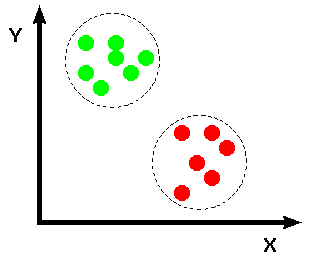Join Slack through this link
This repository contains a curated list of some of the awesome small projects made in Python that you can code away this summer.
It includes analysis of different Python modules, a deep analysis of the Python statistics modules and dataframes like Pandas.
It has some projects on classification, correlation and regression which are the fundamental building blocks of Machine Learning and Neural Networks.
The repository is still under development. Only the source code has been uploaded so far. Implementations and results using Jupyter Notebooks will be implemented shortly.
New to Python? Take a look here.
We are glad to partner with IIT Kharagpur as a part of the Kharagpur Winter of Code. We are proud to host this Open Source event during the winter months and we hope you have a great winter this year.
See Project Ideas here
- Tic-Tac-Toe
- Hangman
- Caesar-Cipher
- Translations of Hamlet
- Classification
- Whisky Classification
- Bird Migration
- Social Network Analysis
- Prime
- Website status check
- Encryption-Techniques
- Inception Tic-Tac-Toe
- Sprint
Tic-Tac-Toe (or noughts and crosses) is a simple strategy game in which two players take turns placing a mark on a 3x3 board, attempting to make a row, column, or diagonal of three with their mark. In this homework, we will use the tools we've covered in the past two weeks to create a Tic-Tac-Toe simulator and evaluate basic winning strategies.

Hangman is a simple game where a player will guess a word letter by letter.
In this project, you will create a program that generates a random word that you must guess.
A cipher is a secret code for a language. In this study, we will explore a cipher that is reported by contemporary Greek historians to have been used by Julius Caesar to send secret messages to generals during times of war.
The Caesar cipher, also known as a shift cipher, is one of the simplest forms of encryption. It is a substitution cipher where each letter in the original message (called the plaintext) is replaced with a letter corresponding to a certain number of letters up or down in the alphabet.
In this way, a message that initially was quite readable ends up in a form that can not be understood at a simple glance.
In this case study, we will find and plot the distribution of word frequencies for each translation of Hamlet. Perhaps the distribution of word frequencies of Hamlet depends on the translation.
In this case study, we will analyze a dataset consisting of an assortment of wines classified into "high quality" and "low quality", and will use k-Nearest Neighbors to predict whether or not other information about the wine helps us correctly guess whether a new wine will be of high quality.
In this case study, we have prepared step-by-step instructions for you on how to prepare plots in Bokeh, a library designed for simple and interactive plotting. We will demonstrate Bokeh by continuing the analysis of Scotch whiskies.You can go through the article - here
In this case study, we will continue taking a look at patterns of flight for each of the three birds in our dataset.Documentation of this project available - here
Homophily is a network characteristic. Homophily occurs when nodes that share an edge share a characteristic more often than nodes that do not share an edge. In this case study, we will investigate homophily of several characteristics of individuals connected in social networks in rural India.
The implementation of Sieve of Eratosthenes is used to find prime numbers.
A simple website crawler to check the return code of a website. It returns with a message indicating whether the website is online, redirected, or not found.
Encryption is an interesting piece of technology that works by scrambling data so it is unreadable by unintended parties. The technology comes in many forms, with key size and strength generally being the biggest differences in one variety from the next. This repo has implementations of different encryption techniques. More here.
New to Python? No problem! Take a look at the following resources:
- Python beginners guide
- Python course by Google (online course)
- Learn Python the Hard Way (book)
- MIT: Introduction to Computer Science and Programming in Python (open courseware)
- Python for Developers(book)
- How to Think Like a Computer Scientist(book)
- Byte of Python(book)
- Pycharm EDU - A helpful program that teaches Python. It includes many lessons on basic Python. It also has tests, checks, and hints to help you through each programming activity!
To see a list of all contributors see here







